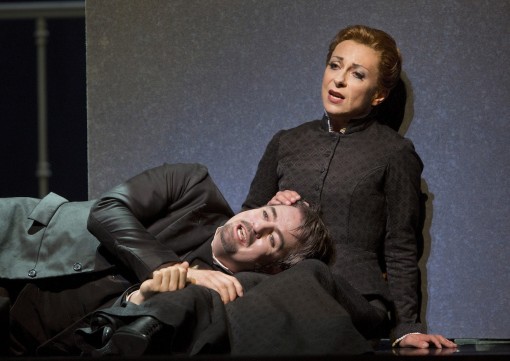SFO’s superb cast and quirky staging make for a distinctive “Hoffmann”

Matthew Polenzani and Natalie Dessay in “The Tales of Hoffmann” at San Francisco Opera. Photo: COry Weaver
After the Gospel of Mary Magdalene debacle the previous evening, it was pure pleasure to sit back and enjoy San Francisco Opera’s quirky, vocally superb production of Les Contes d’Hoffmann Thursday night at the War Memorial Opera House.
For the company’s first production in 17 years of Jacques Offenbach’s fantastical story of the dissolute poet E.T.A. Hoffmann, San Francisco Opera has mounted a compelling new staging by Laurent Pelly and Chantal Thomas (a co-production with L’Opera National de Lyon and Barcelona’s Bran Teatre del Liceu).
Thomas has taken her scenic inspiration from the Belgian Symbolist painter Leon Spilliaert. While the predominance of muted greens and grays doesn’t exactly provide a feast for the eyes, the towering minimalist panels and stark, shadowy visuals work effectively although the prevailing drabness makes for a darker, more unsettling Hoffmann than usual. Pelly’s subdued, elegant period costuming is more traditional.
With a bewildering array of textual options to choose from in Offenbach’s unfinished work, Pelly largely follows the Michael Kaye and Jean-Christophe Keck edition. So the Muse gets both her Prologue and Violin arias, and the Septet is omitted from the Giulietta scene, among several changes from the traditional Choudens version. In a concession to tradition here, Dapertutto gets his spurious but beloved aria, Scintille diamant.
Matthew Polenzani has grown into the role of the romantically maladroit poet, both vocally and dramatically since his Hoffmann debut in Chicago in 2011. His impeccable French and strong lyric tenor with reserves of power were consistently impressive. Polenzani particularly conveyed the poet’s yearning and melancholy, and his duet with Antonia and mezzo voce tone in the latter acts are the stuff of great artistry.
With her retirement on the near horizon, it was treasure indeed to have Natalie Dessay as Antonia. Even with some fluttery tone and uneven production, Dessay’s imperfect soprano arguably fit the character of the doomed girl, whose weak constitution will not allow her to sing. The role has long dialogue stretches and Dessay’s idiomatic conversational vocal acting brought a touching portrayal and real sense of theater to the role, with the singer providing great dramatic conviction in the duet and finale.
As the Muse/Nicklausse, Angela Brower made a successful house debut, taking over the role intended for Alice Coote. The young American mezzo has a gleaming and flexible voice and was terrific in her dual personas, sexy and graceful as the Muse and convincingly androgynous as Hoffmann’s companion, Nicklausse.
Hye Jung Lee may not be the most vocally dazzling Olympia one will ever hear, but she sang with agility and dedication and provided the requisite comedy as the mechanical doll that Hoffmann falls in love with. She also proved a game colleague: in this production’s clever coup d’theatre, the Korean soprano was hoisted on a crane far above the stage and over the pit with each high note, a device the audience loved, along with Lee’s impressively fast inline skating.
Giulietta, who here gets accidentally dispatched by Hoffmann, is a shorter assignment but Irene Roberts displayed a glowing mezzo and attractive stage presence as the duplicitous courtesan.
Tall and menacing, Christian Van Horn literally towered over Polenzani, making his quartet of villainous characters—especially Dr. Miracle—creepy and unnerving, which fit well with the grim production. The American bass-baritone has become one of our finest character singers and he brought robust ballast to the ensembles and refined tone to his solo moments.
Steven Cole provided assured comic relief in the henchman roles and impressive dance moves in Frantz’s little aria. Jacqueline Piccolino was aptly imperious as the diva Stella and Margaret Mezzacappa sang well as Antonia’s offstage Mother (though the projected ghoulish video visage was over the top).
Patrick Fournillier clearly know what he is about in this score, the French conductor drawing vital and refined playing from the superb SFO orchestra. Pelly’s direction of the chorus was overly busy and precious at times yet they sang with polish and strength under Ian Robertson’s direction.
Les Contes d’Hoffmann runs through July 6. sfopera.com; 415-864-3330.